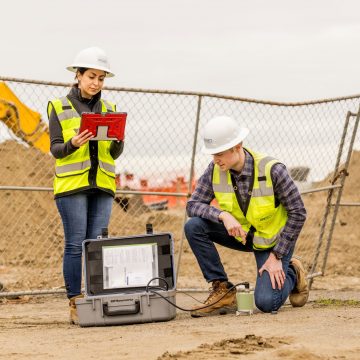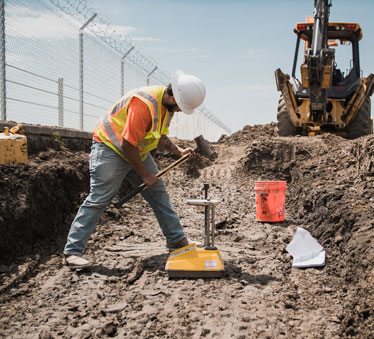The Evolution of Civil Consulting Engineers in the Modern Times
The Evolution of Civil Consulting Engineers in the Modern Times
Blog Article
Recognizing the Comprehensive Function of Geotechnical Engineers in Ground Examination and Soil Evaluation for Building Projects
Geotechnical engineers are important to the success of building and construction projects, offering vital understandings with detailed ground examinations and dirt evaluation. Their expertise in evaluating soil habits and utilizing sophisticated testing methods informs vital decisions that support structural honesty and security.
Function of Geotechnical Engineers
The pivotal role of geotechnical engineers in building and construction tasks can not be overemphasized, as they give crucial understandings right into dirt habits and site problems. These experts are charged with evaluating the suitability of the ground for numerous kinds of structures, guaranteeing safety and stability throughout the building and construction procedure. Their experience includes a variety of tasks, consisting of site characterization, soil tasting, and research laboratory testing, which are essential for determining the mechanical and physical residential or commercial properties of the dirt.
Geotechnical engineers utilize their searchings for to establish fundamental styles that accommodate load-bearing needs and reduce threats connected to dirt incline, liquefaction, and settlement security. They play an essential function in recognizing prospective threats, such as groundwater changes and contamination, which can significantly influence project feasibility. Additionally, they team up with architects, civil designers, and contractors to make sure that geotechnical factors to consider are integrated right into the total design and building and construction stages.
Ground Investigation Strategies
Ground investigation techniques form the foundation of geotechnical design, allowing designers to get a detailed understanding of subsurface conditions. These methods are crucial for assessing dirt buildings, establishing groundwater levels, and determining prospective geological threats.
Usual methods consist of borehole drilling, which permits the extraction of dirt samples at different midsts, supplying crucial data for analysis. Additionally, in situ screening methods, such as Basic Infiltration Tests (SPT) and Cone Infiltration Tests (CPT), are utilized to evaluate soil toughness and thickness directly in the ground.
Geophysical methods also play a considerable duty in ground examinations. Strategies such as seismic surveys and electrical resistivity tomography assistance evaluate subsurface qualities without substantial excavation. geotechnical eng. These non-invasive methods are specifically beneficial in sensitive or huge locations where disturbance must be lessened
Additionally, exploratory trenches can be excavated to aesthetically inspect soil layers and recognize any kind of abnormalities. Each of these techniques contributes distinct understandings, enabling geotechnical designers to establish precise website assessments and educate style decisions. In recap, a mix of these ground investigation techniques is important for successful building projects, ensuring safety and architectural integrity.
Dirt Analysis Approaches
Soil analysis approaches are crucial for comprehending the physical and chemical properties of dirt, which straight affect the layout and building and construction of foundations and other frameworks. Numerous methods are utilized to evaluate soil attributes, making certain that geotechnical engineers get accurate data for educated decision-making.
One typically utilized technique is grain size evaluation, which establishes the circulation of particle dimensions within a dirt example. This is crucial for classifying soil types and forecasting their actions under tons. One more essential technique is Atterberg restrictions screening, which assesses the plasticity and moisture content of fine-grained soils, providing insights right into their engineering residential or commercial properties.

Field examinations, such as Typical Infiltration Examinations (SPT) and Cone Penetration Examinations (CPT), deal important in-situ information concerning soil strength and stratification. Jointly, these dirt analysis approaches create the structure of geotechnical examination, permitting engineers to make secure and reliable frameworks customized to the details problems of the website.
Danger Mitigation Techniques
Applying efficient risk reduction strategies is important for geotechnical engineers to deal with potential obstacles in building and construction jobs. These techniques are vital in recognizing, analyzing, and taking care of dangers related to soil problems, website stability, and groundwater variations, which can adversely impact task end results.
One main approach entails carrying out thorough website examinations that utilize innovative geophysical techniques and thorough soil sampling. By getting exact information on subsurface conditions, designers can make educated decisions on design and building techniques. Furthermore, utilizing read this post here anticipating modeling devices permits the simulation of numerous situations, allowing engineers to anticipate possible problems and execute safety nets.
In addition, developing clear interaction channels among job stakeholders cultivates a joint method to run the risk of monitoring. Routine updates and appointments guarantee that all events understand the progressing website problems and can adjust their approaches as necessary.

Influence On Building And Construction Projects
The performance of danger mitigation strategies directly affects the overall success of building and construction jobs. Geotechnical engineers play an essential duty in this domain name, as their competence in ground examination and dirt evaluation informs crucial decisions throughout the construction procedure. By accurately analyzing dirt conditions and recognizing possible dangers, these specialists enable project teams to design reliable solutions that minimize risks related to ground instability, water seepage, and various other geotechnical obstacles.
The influence of extensive geotechnical evaluation appears in numerous facets of construction jobs, including cost management, task timelines, and architectural honesty. Early recognition of concerns permits for timely interventions, decreasing expensive hold-ups and budget plan overruns. Furthermore, a detailed understanding of site problems enhances the layout and engineering procedure, guaranteeing that structures are built to stand up to environmental stress and prospective natural catastrophes.
Ultimately, the payments of geotechnical engineers are integral to the effective execution of construction jobs. Their job not just promotes safety and compliance with laws but likewise improves the lasting sustainability of structures, making certain that they carry out efficiently throughout their desired life expectancy. The cooperation in between geotechnical groups and various other stakeholders is essential for achieving ideal results in construction endeavors.
Verdict
Finally, geotechnical designers carry out an essential feature in building jobs via extensive ground examinations and soil evaluations. Their knowledge in evaluating soil behavior, employing different examination methods, and executing threat mitigation strategies substantially contributes to the architectural stability and safety and security of developed atmospheres. By collaborating with multidisciplinary teams, these specialists boost project efficiency and ensure conformity with safety and security criteria, inevitably resulting in effective construction outcomes and minimized prospective my sources risks.
Geotechnical engineers are integral to the success of construction tasks, providing important insights through comprehensive ground examinations and dirt analysis.The critical function of geotechnical designers Related Site in building and construction jobs can not be overemphasized, as they provide essential understandings right into soil habits and site conditions. Their competence incorporates a wide array of activities, including site characterization, soil sampling, and laboratory testing, which are critical for figuring out the mechanical and physical buildings of the dirt.
By accurately assessing soil conditions and determining possible threats, these specialists allow task teams to devise reliable solutions that lower dangers linked with ground instability, water infiltration, and various other geotechnical challenges.
In final thought, geotechnical engineers do a critical function in building projects with thorough ground investigations and soil evaluations.
Report this page